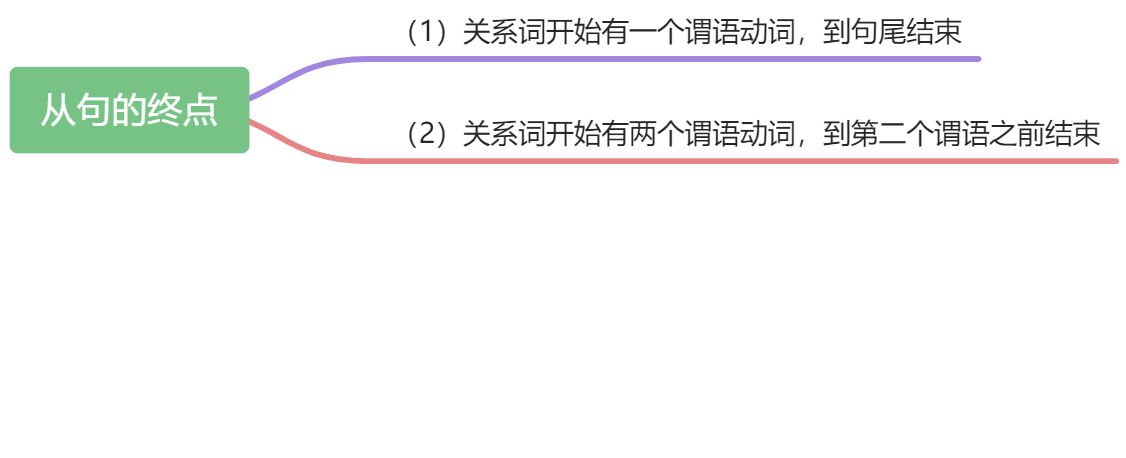从句
从句的起点:关系词
从句的终点

试一试:找出定语从句的起点和终点
:::info
- The man who **is shaking hands with my father is **a policeman.
shaking 颤抖
shaking hands 握手
分析关系词代词who,从关系词开始有两个谓语动词分别为is shaking 和 is
从关系词开始到第二个谓语动词之前结束为从句部分:who is shaking hand with my father
去掉从句部分,看主句翻译是什么意思:The man is a policeman.这个男人是一名警察。
在翻译的时候,再给这个人加上一个定语修饰一下什么样的人,跟我父亲男人握手的人是一名警察
这些关系代词和关系副词都不需要翻译出来,它就是一个符号,它指代的就是前面的先行词,不需要翻译,一旦翻译反而不顺畅了。 :::
:::info
- The film( which they went to see last night )was not interesting at all.
last night. 昨晚。
分析关系代词 which 后面谓语动词went 和 was
从关系词 which开始到第二个谓语动词之前为从句部分,Which they went to see last night.
先不开从句部分,主语为:The film was not interesting at all. 这部电影一点也不有趣.
再把定语从句加上:他们昨晚去看的这部电影一点也不有趣。 :::
:::info
- I still remember the day when I frist **came** to this school.
分析关系代词 when 后面谓语动词came
从关系词 which到句尾从句部分,When I frist came to this school.
先不开从句部分,主语为:I still remember the day. 我仍然记得那一天。
再把定语从句加上 : 我仍然记得我第一次来到这所学校的那一天 :::
关系词的选用
| 关系词 | 先行词 | 从句成分 |
|---|---|---|
| who(关系代词) | 人 | 主语或表语 |
| whom(关系代词) | 人 | 宾语 |
| which(关系代词) | 物 | 主语或宾语 |
| that(关系代词) | 人或物 | 主语或宾语 |
| when (关系副词) | 时间 | 时间状语 |
| where(关系副词) | 地点 | 地点状语 |
| why(关系副词) | 原因 | 原因状语 |
限定条件: :::warning 先行词(空格前面的先行词)_ _ 从句的成分(空格后的从句的成分,看从句部分是否缺少主干成分)
只看空格前的先行词,而忽略从句部分,大部分是做不对的如:
the year(时间)_(从句是否缺少主干成分)
因此我们在做题的时候,不能光看空格前面的先行词,应该也看空格后面的缺不缺什么成分,如果缺主要成分的话:
如果缺了(缺主干成分):主语、宾语、表语这样的主要成分,那么我们应该从关系代词里面选
如果不缺的话,缺的仅仅是一些枝叶成分:应该从关系副词里面选
:::
:::warning
表格解读和应用:
- 如果从句缺少主干(主语、表语、宾语)成分,答案在关系代词中选。
缺不缺宾语涉及到动词的及物性
:::warning
缺主干成分(主语、表语、宾语):
如果谓语动词是及物的:
及物动词vt_(后面没有宾语)_ _ 缺少宾语
如果后面是不及物动词:
vi(不及物动词永远不会跟宾语),不缺宾语
再看缺少主语和表语
(很明显这里缺少主语) is learning (vt) (缺少宾语)__
:::
- 如果从句不缺主干分成,答案在关系副词中选
:::warning
不缺主干成分:
不及物动词vi(不缺宾语)
vt+宾语
如果及物动词后有宾语,那么它就不缺宾语
was(be动词 系动词)(缺少表语)_
:::
- 在结合先行词最终确定答案( 先行词起到参考的作用)
两个特殊的关系词——-whose 和 as
whose的用法:
1.whose + n (其他的都不能加名词,唯独whose,有的时候可以在名词前面加形容词adj)
:::warning
例:
- Tom( whose father **is a teacher )is** one of my best friends.
分析Tom 先行词
①关联词 whose,从句从whose开始发现有两个谓语动词,到第二个谓语动词结束为从句部分 whose father is a teacher.
②看主句的意思 Tom is one of my best friends. 汤姆是我最好的朋友之一
③主句加上定语从句意思:他的父亲是一名教师的汤姆,是我最好的朋友之一
看 whose 的使用,在whose后面直接加了名词 father. whose + n
- Jack( whose native language is French )is travelling in the U.S.A
分析Jack 先行词
不看从句意思:杰克正在美国旅游。
再看定语从句部分:杰克他本国语言是法语现在在美国旅游;
关系词是whoes + native (adj.本国的;土著的;天然的) + language(n); whose + adj + n
:::
2.先行词既可以是人也可以是物。
:::info The house (whose windowns face the sea is located )by the oceam.
分析定语从句部分 whose windowns face the sea is located
先行词是物 house whose后面直接加上一个名词 windowns,说明其先行词既可以是人也可以是物
:::
as的用法:
- 放于句首的用法:As + is\was done (known,reported,said,estimated) , 逗号不能省略 具(了解,报告,说,估计)= It is / was + done that + 句子……….
:::info
汉译英:据报道,暴雨可能在未来24小时到达本市。
As is reported,storm is likely to arrive in(城市是大地方用in)this city in the future 24 hour.
It is report that storm is likely to arrive in this city in the future 24 hours.
:::
- as放于句中的用法:
1.先行词被 the same 或 such 修饰
典型例题
:::info 1.We were disappointed yesterday because it wasn’t such a good dinner_as_she had promised us.
A.like
B.as
C.which
D.what
翻译:我们昨天很失望,因为这不是她答应我们的那么好的晚餐。
分析先行词dinner,在先行词前面有such来修饰,用as引导的定语从句
:::
:::info
1._we all know, Chinese is one of the most beautiful languages in the word
A.That
B.As
C. Which
D. What
As we all know(主动) = As is known to all (被动)众所周知
分析前面有逗号 ,空格又在句首,为As :::
精讲精练 :::info 1.The place _interested me most was the Children’s Palace
A. which
B. where
C. what
D. in which
分析做题的方法就是不要只看先行词,一定要先看从句部分,看从句里面是否缺主干成分,缺主干成分就从关系代词里面选,不缺主干成分从关系副词里面选,
如果是特殊的就想到whose和as
很明显选项都是关系词,并且在空格前面有一个先行词,为典型的定语从句结构,排除没见过的C (what名词性从句的关系词)
D. in which 暂时不知
A which 关系代词 B where 关系副词,我们需要关系代词还是关系副词,取决于从句的成分是否完整;缺主干成分为关系代词 ,不缺主干成分从关系副词里面找
下面进行分析:
从空格开始(关系词的位置)为从句的起点,有两个谓语动词,第一个为 interested(独立谓语) was(独立谓语),则到第二位谓语动词之前为从句部分
_interested me most.缺不缺成分那就看从句部分了,很明显这个从句缺少主语,主语就是典型的主干成分,主干成分缺失就是典型的关系代词;
选关系代词,为which
:::
:::info
2.Do you konw the year _the Chinese Communist Party was founded?
A. which
B. that
C. when
D. on which
Communist 共产党
Party 派对
Chinese Communist Party 中国共产党
分析该从句的谓语动词为was founded,只有一个谓语动词was founded 为复合谓语 被动语态be done,只有表被动形式的(无论是谓语还是非谓语形式) 后面不能加宾语
则从句部分为 _the Chinese Communist Party (主)was(系) founded(表) ,因此从句不缺主干成分则不缺关系代词 which that
应该选关系副词,只有C when为关系副词
:::
:::info
3.That is the day _I’ll never forget.
A. which
B. on which
C. in which
D. when
分析找到从句,从句部分只有一个谓语动词 will foger,从空格开始到结尾 __I’ll never forger.
先看是否缺主干成分:
谓语动词为 forget (vt 及物性动词)后无宾语,则缺少宾语,则缺少主干成分,应选关系代词 which that who whom
选which
:::
:::info
4.Great changes have taken place in the factory__we are working since then.
A. where
B. that
C. whichq
D. there
take place 发生(vi ,没有被动语态)
分析先看从句部分 , 谓语动词 are working (be doing)复合谓语,在其前面有个主语We了不缺主语, 而谓语代词里面的work是不及物动词vi ,后面不缺宾语,即不缺主语也不缺宾语,应该选关系副词,而空格前面的先行词为factory地点,因此应该选where
:::
:::info
5.The foctory _we**‘ll visit next week is** not far form here.
A. where
B. to which
C. which
D. in which
分析从句中第一个谓语动词为 will visit,第二个为 is,则谓语部分为 we’ll visit next week. 主语为we,谓语动词为 will visit(vt,及物动词)后加宾语,从句中没有宾语,说明缺少宾语,选可以做主干成分的关系代词 which (who,whom,which ,that)
:::
:::info
6.Is there anyone in your class _family **is** in the country ?
A. who
B. who’s
C. which
D.whose
country. 乡村,国家
countryside. 乡村
分析从句部分为 family is in the country. 主 谓
in your class. 地点状语
如果选项出现whse首先考虑whse,如果whose后面加的是名词,则一定选的就是whose,family为名词
:::
:::info
7.I can never forget the day _we worked together and the day__we spent together.
A. when; which
B. which; when
C. what; that
D. on which; when
分析第一个空的从句为 we worked together,首先不缺主语,worked 不及物动词后面不缺宾语,及不缺主语也不缺宾语,选关系副词 when
第二个空,we spent together. spent 花费时间的意思,为及物动词 后加宾语,但后面无宾语,即缺少主干成分,用关系代词 which (因为第一个空已经选when直接就可以选A了)
:::
:::info
8.I lost book,_title I can’t remember now.
A. whose
B. which
C. its
D. that
分析选项出现了whose首先考虑whose,看后面是否+ n或 whose + adj + n
title n,题目,标题 选 whose
:::

